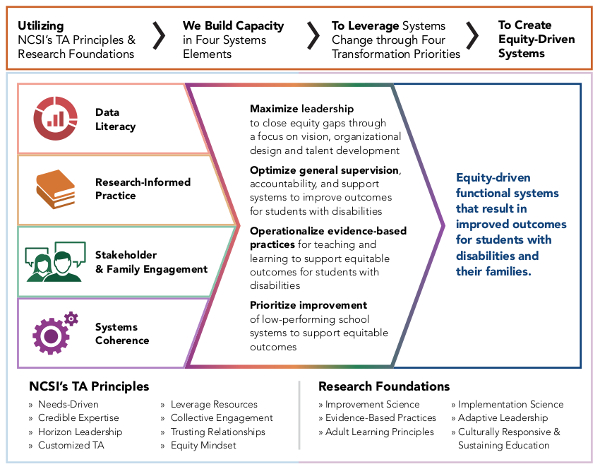About Us > Overview
NCSI provides differentiated support through Universal, Targeted, and Intensive technical assistance to support SEAs to best use their general supervision and professional development systems to establish and meet high expectations for every student with a disability.
The Need for a National Center for Systemic Improvement
State education agencies play a key role in policy development and implementation, striving to support the field in meeting the needs of students with disabilities and their families. To succeed, they turn to trusted partners to strengthen capacity to lead systems change that improves both learning conditions and outcomes.
NCSI is a critical partner to states in these pursuits, assisting them to both learn about and understand seminal research, as well as translate that research into practice. Paying attention to the systemic functions of data literacy, evidence-based practices, stakeholder engagement, and systems coherence, NCSI helps SEAs to cultivate knowledge and skills that enable them to achieve lasting impact for students.
NCSI Conceptual Framework
Targeted Outcomes for the NCSI
- Click here to see NCSI’s progress towards our outcomes for 2022-2023
- 1. Increased capacity of SEAs to align with broader general education initiatives to ensure ESSA and IDEA implementation best supports the needs of CWD;
- 2. Increased capacity of SEAs to effectively implement their general supervision systems that serve to improve results for CWD, while maintaining compliance with the IDEA;
- 3. Increased capacity of SEAs to effectively implement, evaluate, and revise (as necessary) their SSIPs and ensure progress toward meeting their SIMR;
- 4. Increased effectiveness of SEAs in meaningfully and authentically engaging diverse State (including State-level partnerships) and local stakeholders in ways that will support the effective implementation of ESSA and IDEA;
- 5. Increased capacity of SEAs to support LEAs in selecting and implementing EBPs within frameworks (e.g., MTSS, positive behavioral interventions and supports (PBIS), response to intervention (RTI), and others);
- 6. Increased capacity of SEAs to fully engage families, including partnerships with OSEP- funded parent centers and the Office of Elementary and Secondary Education (OESE) Statewide Family Engagement Centers in the implementation of systemic improvement efforts;
- 7. Increased capacity of SEAs to deliver effective TA to LEAs using an aligned TA model grounded in implementation and improvement sciences through collaboration with OSEP- funded TA centers; and
- 8. Improved access to objective information for families and youth with disabilities on the range of quality educational options & supports.
